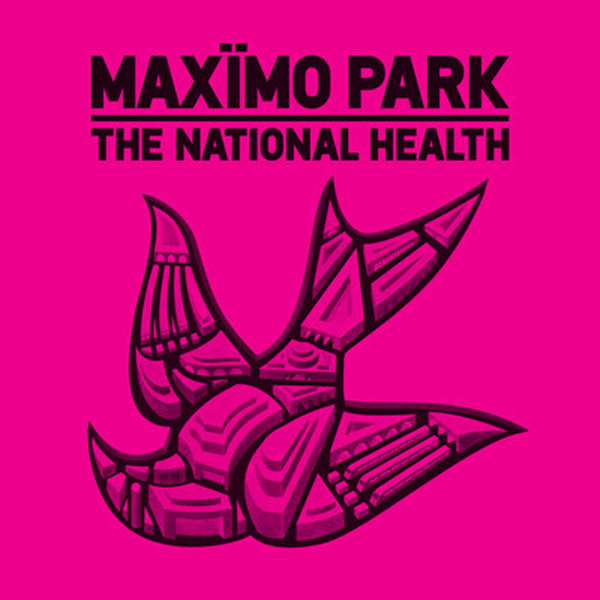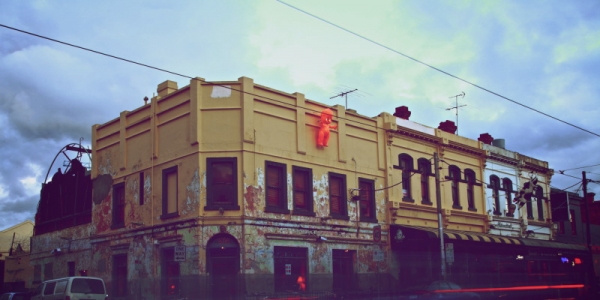Maximo Park arrived with their breakthrough debut, A Certain Trigger. The Mercury Prize-nominated album came at the height of the post-punk revival, when snappy and polished rock was flooding the airwaves. Great Britain, once a bastion for diverse and groundbreaking music, became churning out bands of a similar ilk with great speed and propulsion. Efforts to capitalise on this admittedly catchy genre of rock were widespread, though the market was soon flooded. As with any rising sub-genre in the 2000s, the post-punk revival was short lived.
Where then, did that leave Maximo Park? The rise and fall of the genre they were closely associated with doesn’t change the fact that A Certain Trigger was still a concise and contagious listen. Yet their following two albums, 2007’s Our Earthly Pleasures and 2009’s Quicken The Heart were confusing in terms of their ambition and scope. The band treaded water, afraid to totally ditch their hooky pop-rock but still refusing to take grand leaps in terms of their sonic aesthetic. Three years separated the release of Quicken The Heart and The National Health, the longest Maximo Park ever has ever taken between records. Time allowed the band a chance to regain focus on the task at hand: namely, remembering to stay positive in an often merciless field of work.
“I’ve certainly realised how positive the songs are,” says Smith, after being asked if his relationship with The National Health has changed since its release. “While we were making the record, we realised that in terms of themes, there’s the idea of coming through something and having a new day. Putting your troubles behind you. It can be a very negative world, so we’re trying to find the positive. The title track is about travelling on a train as a way to overcome frustration. So when we play those songs, it’s great to see people smiling. It’s great to see that the songs have evolved a bit in that regard.”
Reached by phone from his home during a rare touring break, there’s a relaxed, thoughtful charm to Smith. “This is my week off, where I get to sleep in my own bed, do the washing,” says the mild-mannered 33-year-old. “That’ll take up most of my time.”
While Smith’s pensive offstage persona may strike as a direct contrast to his manic onstage attitude, he hints repeatedly throughout our 25 minute conversation that when it came to writing The National Health, things weren’t always calm and rosy in the Maximo Park camp. The determined outlook of all five members of Maximo Park, particularly Smith, was compounded by their relative stubbornness. A focused credo of The National Health is easy to describe afterwards, but as Smith tells it, the band had to unify themselves in order to move forward with the record.
“When we were making this record, we found it difficult to form one single idea about where the band was headed,” he says, bluntly. “Because we are all quite headstrong, the five of us. We all have a hand in writing the songs. If my lyrics aren’t what people want to hear in the band, then either I leave the band or I work with the band to try and get somewhere. There are all sorts of little difficulties in trying to unify the band and trying to make a record in the first place.”
Smith honours the band as a unit by refraining from detailing any particular salacious issues the band dealt with. Instead, he insists that the Newcastle five-piece is “…trying to remain friends, so we’ve been focusing on the positives of the band.”
In focusing on the positives of Maximo Park instead of harping on the band’s shortcomings, Smith maintains the band was able to attain some perspective not only about the recording process, but the band itself. Refusing to be limited, Smith admits the band entered the studio with different ideas about which direction the band’s sound and vision should be heading in.
The band’s demos for The National Health ended up sounding more like imitations of some of their influences than attempts to harness their live prowess. Evolution might have been on the band’s agenda, but Smith insists that they became overwhelmed with opportunity and lost their focus.
“We tried to evolve too far. We recorded a few songs, demos, that we thought could work for the album, and they were almost in My Bloody Valentine territory. Kind of dreamy and overdone. We’d go back and listen to the songs and there was something not quite right about them,” he admits.
Had The National Health ended up sounding as muddled and meandering as their previous two releases, the Maximo Park name may have been damaged beyond repair. But with age, Smith hasn’t just been able to attain perspective, but maturity as well. Once the band admitted their mistakes, something had to give. Stopping the process head-on and being critical about their output signalled the turning of the tide for the band.
“That was a breakthrough for us, because we were able to approach the songs differently, with a very clean slate. We got very happy, thinking, ‘Yea, finally, this sounds like us, but it sounds fresh.’
“Sometimes when you’re writing songs, you’re trying to move away from what you’ve done,” he continues, “and sometimes you move too far. We realised we didn’t need to, because we’ve got our own sound.”
Maximo Park had to look within and begun to practice what they preached. From the outside, The National Health is in large part an examination of England’s place in the world. Between the Queen’s Jubilee and London hosting the 2012 Olympic Games, the eyes of the world were certainly keen on how England would portray themselves. Smith admits that lyrically, he considered a critical analysis of modern England. But for the most part, he heeded his own advice and put the band under a microscope instead.
“A lot of the music on the record, at least from a textural aspect, can be applied to the band itself. The song Waves At Sea ends the album and it was written on a very personal basis. It felt like after the last record, we still had more to say as a band. So each time we make a record, we’re thinking the same way. ‘Does the world need this record? Should we be making it?’ And lately we’ve felt like we should. So it’s good to have some level of self-assessment.”
With a level of self-awareness, Smith pulls no punches when it comes to talking about the reception the band’s last two records garnered. He concedes that the band understands their sound is often put into a comfortable box and generalisations are quick to be made. Sticking to the script and taking risks might have seemed like the only options for the band. Yet Smith asserts they found a harmony between the two options.
“There is a balance between going too far and sticking to a formula. It might be difficult to reach out to people that’ve written us off, but it sounds unlike anything we’ve ever done,” he continues. “It’s a tricky balance but we’ve been talking a lot more about stuff than we ever have. We’re trying to remain friends. It’s necessary for members of the band to be a bit critical of things you’ve done, but if you focus more on what we’re doing right, you’re able to get so much more done.”
The results speak for themselves. Sounding energised but never repetitive, Maximo Park “…ended up in a good place by the end of the new record,” according to Smith. The growing pains now behind them, the band spent much of 2012 on the road. No intense, camera-laden therapy sessions were needed to rescue Maximo Park. Instead, the band just had to look long and hard in the mirror. Ultimately, they liked what they saw.
“We’ve accepted ourselves and we’re revelling in it,” says Smith. “We’ve been able to write pop songs that we’re proud of; if we look back at our original aim, it was that, to write a pop songs that bring out the best in people. And as an entity, we’ve discovered that writing catchy pop songs that people to relate to is nothing to be ashamed of.”
BY JOSHUA KLOKE







